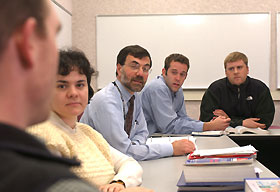|
This is an archived article.
For the latest news, go to the
Advance Homepage
For more archives, go to the Advance Archive/Search Page. | ||
|
Head Of Primary Care Treats Dr. Bruce Gould comes from a family of service. His father was a teacher, and his mother a homemaker and community activist. Together, his parents established a group that regularly visited a state mental institution. "My parents would take the residents out, sometimes on day trips to New York, so they could remember what the world was all about," says Gould.
While in high school, Gould volunteered regularly at Creedmore State Hospital in New York City. "It was an eye-opening experience," he says. After gaining a medical education that was grounded in general medicine and primary care, Gould landed a position as medical director at a clinic in Hartford for the underserved. That was in 1988, and Gould has held the position through various institutional changes. Currently, he is medical director of the Saint Francis Hospital/University of Connecticut Primary Care Center at the Burgdorf/Fleet Health Center in Hartford, where he oversees medical residents and students and treats patients. At the UConn School of Medicine, Gould is associate dean for primary care, and director of the Connecticut Area Health Education Center Program, a position he has held since 1997, when the AHEC program was established to address access to, and quality of, health care delivered to the underserved in the state. He is also chair of the Nutrition Curriculum Committee at the medical school and has been nominated to be chair of the National Advisory Council on Migrant Health of the Bureau of Primary Health Resources and Services Administration in Washington. Gould says he learned what it really meant to serve the underserved when he visited the home of an elderly couple he'd been treating at the clinic. The husband was in a nursing home, but his wife remained at home. Gould heard that Meals on Wheels was having difficulty delivering a meal, so he went on a home visit. Inside the house, he saw piles of clothes and rags lining the hallway. He had to walk sideways to get through. He found the woman in the back of the house, surrounded by piles of rags and refuse she'd collected. "She couldn't continue to live in the unhealthy squalor, and in a 150-year old house in dire need of maintenance," he says. Gould convinced the old woman to come to the clinic the following day. She was admitted to the hospital for treatment, and in a few days was placed in the same convalescent home as her husband. A few days later, the house burned down. Gould says the experience of seeing a snapshot of his patients' daily lives helped him understand what was going on and create a better treatment plan - and a better outcome - for them. "I saw the sharp contrast between seeing them at the clinic and seeing them in their day-to-day environment," he says. Gould was instrumental in establishing the Migrant Farm Workers program at the School of Medicine in 1998. The initiative has grown, and is now part of a collaboration of organizations aimed at improving conditions for the 15,000 migrant and seasonal farm workers who pass through the state each year. Medical students organize the farm visits, set up schedules for the clinics, and recruit volunteers. "The students offer what is most likely the only access to health care for the workers, who are often reluctant to seek medical attention because of the potential expense," says Gould. "They also get involved in basic primary care and learn about public health and occupational medicine." Now as a member of the National Advisory Council on Migrant Health of the Bureau of Primary Health Resources and Services Administration, Gould has met and befriended people involved in trying to improve the lives of migrant farm workers across the country. Gould earned his undergraduate degree with distinction from Cornell University, and his medical degree from SUNY Upstate Medical Center, College of Medicine, in Syracuse, N.Y. He completed an internship, residency, and fellowship at the University of Massachusetts Medical Center. His most recent awards and honors include a Fellowship in the American College of Physicians; Pride in the Profession/Heroes in Medicine Award from the American Medical Association; the Hartford County Medical Association's Distinguished Service Award; and the Connecticut American College of Physicians Community Service Award. He was also appointed as a National Health Service Corps Ambassador. |

